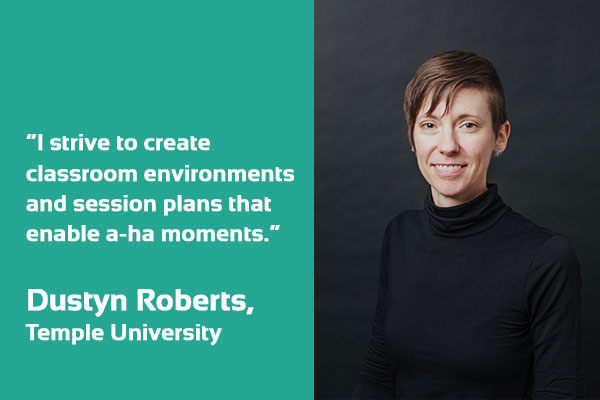
We continue our series highlighting educators within the VentureWell network who are doing good work—faculty members who are catalyzing change in higher education and inspiring students to impact the world through invention. This month’s faculty spotlight is Dustyn Roberts, PE, PhD, Assistant Professor of Instruction in the Department of Mechanical Engineering at Temple University. Roberts is an active member of the VentureWell community, serving as a Principal Investigator for Faculty Grants and an I-Corps team, and a presenter at our OPEN conference. She is also the recipient of an E-Team grant, an ASPIRE participant, and Pathways in Innovation team member.
How did you get interested in teaching entrepreneurship?
Before graduate school I took a class called Idea to IPO. I also attended some startup conferences and meetups. I had my own consulting company at the time, but didn’t think of myself as an entrepreneur, and didn’t understand the process of creating value from an idea. Once I began teaching at the University of Delaware and started working closely with the Horn Center for Entrepreneurship on different initiatives, I learned more about evidence-based entrepreneurship. I found ways to integrate the concept into my courses. That journey also led me to co-found a startup with two students called Sage Smart Garden, LLC.
What is your favorite thing about teaching?
Watching the “a-ha” moments happen with students in the classroom. When a student grasps a concept or realizes a new skill for the first time, I can almost see the light bulb turn on. I continuously strive to create classroom environments and session plans that enable these moments. I also try to foster collaboration so students can help create those moments for each other.
Where would you like to see the field of entrepreneurship in five years?
I see entrepreneurship and entrepreneurial mindset as a parallel field or thread that can and should complement almost every other discipline. Whether you want to save the gorillas or create a taco-making robot, students need the skills to understand how to wrap a business model around an idea in order to make it a reality. I think that in five years we will see more intentional and integrated curriculum across universities that enables this to happen.
What traits make for great teachers, advisors, and mentors?
I think all the traits that make for great teachers, advisors, and mentors boil down to one: you have to care. Caring allows you to seek out opportunities to better serve your students, advisees, and mentees. You will engage in professional development to be the best teacher, mentor, or advisor you can be. You will also find ways to improve systems and ecosystems for everyone involved.
What books on entrepreneurship and innovation have you been reading lately?
The curriculum for the NSF I-Corps Teams program I went through with my startup required The Startup Owner’s Manual by Steve Blank and Bob Dorf and Business Model Generation by Alexander Osterwalder and Yves Pigneur. I think both of these books are critical for forming the vocabulary of evidence-based entrepreneurship.
What’s your most useful classroom activity or assignment?
I have recently started using a few percentage points of the grade for my classes for service and professional development. The students can earn these points in a wide variety of ways, from helping their peers through in-class activities to attending job fairs or events at the Franklin Institute. The deliverable for each assignment is to 1) demonstrate they were there or did the thing they claim (typically a selfie in front of an event sign or a sign-in sheet), 2) describe the service or professional development activity, and 3) write a short paragraph on their reaction to the event. Reading these reactions has been fascinating, and in some cases has led students to new interests and career opportunities they might not have otherwise sought out. It’s kind of a hack to encourage intrinsic motivation with extrinsic rewards.